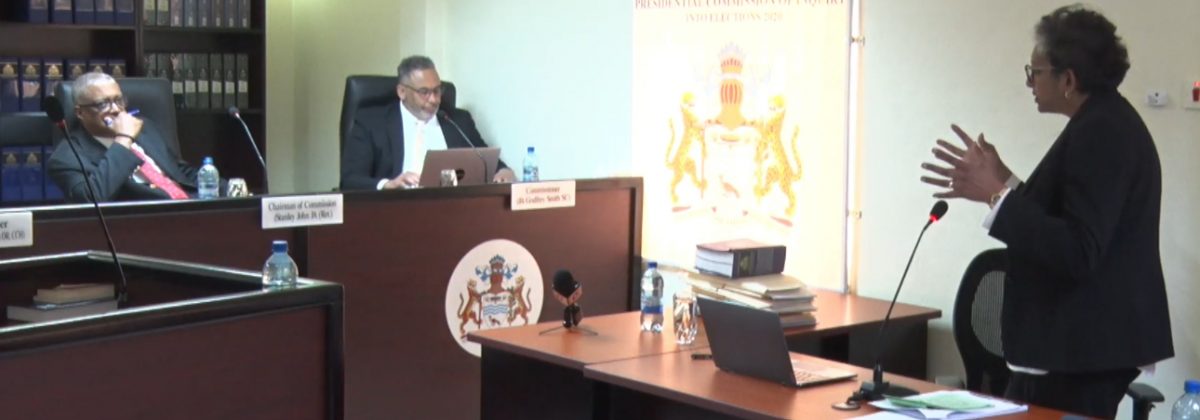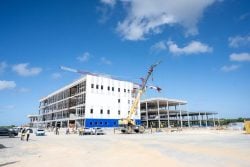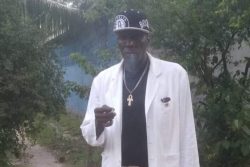The Commission of Inquiry (CoI) into the controversy-ridden March 2020 General and Regional Elections concluded yesterday and Chairman, Justice (retired) Stanley John said that the final report will be presented to President Irfaan Ali “in the shortest of time.”
In thanking everyone for the role they played, the Chairman said, “What we have seen and heard over the past several weeks we will distill and in the shortest of time present a report to His Excellency the President.”
The elections inquiry which began hearings on November 3, 2022, yesterday heard closing remarks from the commission’s counsel, Senior Counsel Sophia Chote who said that based on the evidence provided the results for the 2020 elections would have been known by the APNU+AFC and PPP/C through their statements of poll one day after votes were cast countrywide.
She pointed out that the system in place on elections day itself worked well with there being no issues with how it was conducted. However, she said it was realized that because the two “juggernauts” (APNU+AFC and PPP/C) in the race contested in all the districts and they were getting their statements of poll, “I don’t think it is unreasonable for this commission to infer that after the close of polls on the second perhaps by the next day, the two juggernauts would have had the totals.”
She said this could explain “why things then went” left after the results were known.
She noted, that the commission heard that when persons returned on March 4, 2020, the District Four Returning Officer, Clairmont Mingo was not there and there was no accounting for his absence.
“And what we then have is a convoluted process of delay, changes in procedure, a lack of transparency, a lack of accountability, and deliberate manipulation of the process to make it as opaque as possible” for the party agents and observers.
Shortly after, then Deputy Chief Election Officer (DCEO) Roxanne Myers informed those present that Mingo was ill but Chote noted that what was interesting was that after Mingo had left, Myers then informed that he was better and would be present to restart in forty-five minutes.
She said, “There is really no reasonable and lawful explanation for what took place” after polling day, noting that the commission was able to hear what transpired from several witnesses.
She pointed out that in addition to the witnesses testifying, there were also audio-visual materials “independently recorded which they produced to you.”
According to her, one of the requirements of Gecom is to provide facilities for party agents and observers, all of which were in place, noting “Gecom did a great job” when people started arriving at the Ashmins building those were in place.
She said, when the inquiry commissioners visited the building there was a lot of physical capacity for transparency noticed, however, “the actions of those who wanted to pervert the rule of law turned Gecom into a dark and opaque place, and that could have led to very serious consequences for this country.”
She then added that she hoped those persons who decided to take such actions have recognized by now how “dangerous what they did was to the legal and social and moral fabric of Guyana.”
Chote said that citizens of the country expected Gecom “to do the right thing” because they placed their trust in Gecom to adhere to the law. She said, that it then begs the question “did these people do the right thing?”
Additionally, she told the commission that they would have to look at Mingo’s conduct to say whether he did or did not do what was required of him as a returning officer in those circumstances.
She reminded that in that process it is not the Chief Election Officer, Keith Lowenfield, or Deputy Chief Election Officer that is responsible for the tabulation “in fact they are supposed to keep out of it.”
However, she said, that what they saw was an insinuation by the CEO and DCEO into the process which Mingo was supposed to be carrying out.
She questioned, “What legal authority allows this to happen?” and she then stressed that nothing was permitting Lowenfield or Myers to participate in the process that Mingo had to conduct
In fairness to them, she noted that clearly at that point Mingo was “MIA” (Missing In Action), however, she asked whether the “reasonable option” would not have been to find out what arrangements Mingo would have put in place for the process to continue “instead what you have is the CEO and DCEO coming down and interfering in the processes which are supposed to be conducted by the RO, why did that happen?”
She said attorney at law, Nigel Hughes’s cross-examination on behalf of Myers, opened her eyes to certain things at the Ashmins building where the structure was that the CEO and secretariat were at the top floor.
“This is the physical setup which they are starting with, probably an indication to their mindset as to what powers and authorities they had… The (Gecom) commissioners who are at the top of the legal structure are given a space on the second floor”, Chote stated.
She said the cross-examination of Gecom commissioner Sase Gunraj in particular revealed that persons had to be tagged to enter the third floor.
“The (Gecom) commissioners had no access to what was going on there” as she said she asked herself “what on earth is going on there?”
Chote also stressed that what is known is that there was absolutely no reason for armed ranks of the police Tactical Services Unit (TSU) to have been deployed to the Ashmins building.
She added that there is something sinister about the commissioners being excluded from any part of the building where they are supposed to be present to carry out their constitutional duties.
“That physical arrangement in my mind is a reflection of how the secretariat of Gecom saw itself… Secretariat of Gecom didn’t see themselves as being responsible to the commissioners, they saw the commissioners as being responsible to them, that’s the bottom line”, she asserted.
Meanwhile, touching on Gecom itself, Chote said a problem existed before the elections, as Gecom is “partisan” as she noted that to even have a quorum at least two commissioners from each side have to be present. “So even to meet you have problems, if there is an issue of which you are politically divided, all the commissioners have to do is stay away then the commission cannot convene, perhaps the law with respect to that should change”, she opined.
Riding with a posse
Meanwhile, in her closing remarks, she also said that while the CCJ called Lowenfield a lone ranger in his attempts to compile and present a report of the elections results not using the National Recount she believes that he was not a lone ranger but was “riding with a posse.”
“All of what occurred could not have happened had he been a lone ranger,” she said as she highlighted some of the things witnesses testified to Lowenfield doing.
She stressed that it is known that the citizens of Guyana were held at ransom because of the “activity of these people from the fourth of March onwards.”
She added, that those who may misguidedly think that the COI has a “political agenda” need to put that out of their minds, pointing out that representatives from six political parties testified at the inquiry. “These people were adversaries for the 2020 election but yet when they come to give you the evidence, there is a remarkable coincidence in the account of what they have presented.”
Meanwhile, attorney at law, Keoma Griffith also in closing assisted with a presentation of audio, video and pictures as to the events that transpired during that time at Ashmins building.
The presidential commission of inquiry was triggered by the five-month delay in the declaration of results during which there was an attempt to rig the results in favour of the incumbent APNU+AFC. Major figures at the centre of the allegations declined to testify before the COI. A number of them remain before the courts on a variety of charges.






